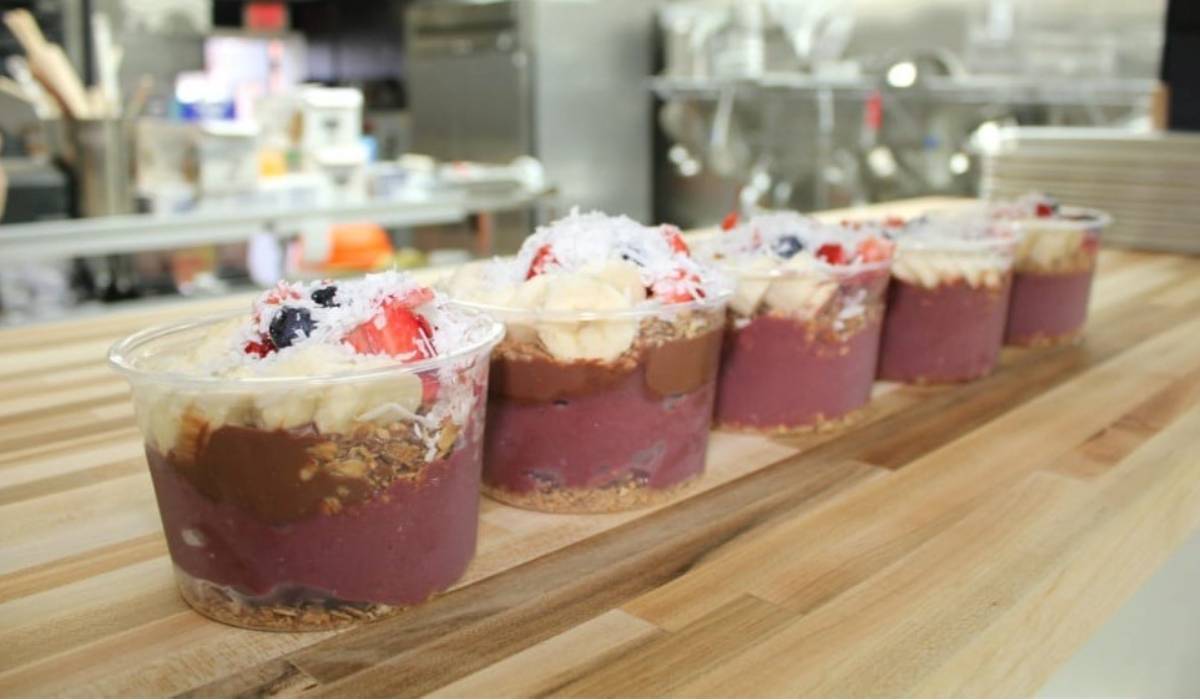On a beach in San Diego, Jason Mazzarone had just finished surfing when he discovered an acai bowl stand. It was the spark that would launch SoBol, a brand that now has more than 50 franchises in seven states.
When Mazzarone, who moved to San Diego for culinary school, returned home to Long Island, New York, there were no like-minded concepts in sight.
Mazzarone grew up around his family’s business, an Italian ice shack founded by his grandfather. He had the entrepreneurial spirit in his genes. So Mazzarone decided to start making his own version of acai bowls for his family.
He then took it a step further. One morning, Mazzarone decided to see if he could sell the purple bowls at his family’s Italian ice shop.
Around eight years later, Mazzarone has proven that and more. After officially incorporating in 2014, the acai bowl and smoothie brand has taken off, relying on a franchise-heavy model since 2016, with only three corporate locations out of the 51.
SoBol stands out for its unique granola, Mazzarone says. With his culinary school background, Mazzarone brought a creative and flavorful taste to the now popularized product.
Founder: Jason Mazzarone
Headquarters: Long Island, NY
Year started: 2014
Annual sales: $22 million (2021 prediction is $30 million)
Total Units: 51
Franchise Units: 48
Customers choose between bowls and smoothies with a combination of acai, kale, spinach, berries, mangos, and pitaya.
When it comes to what SoBol is known for, Mazzarone is a hospitality guy through and through, he says.
“You get no more satisfaction than making something for someone and seeing the smile that it puts on their face,” Mazzarone says. “Our mission at SoBol is to be day improvers. We want to improve others’ days, and when you deliver something delicious and healthy and positive, for me, that’s the best part of all of this: the reaction when someone tries their first SoBol.”
Watching franchise SoBol locations find success was a rewarding experience for Mazzarone, who aims to mentor and support fellow operators.
“We’ve found the most success is when they’re opening in their home community and they’re the locals and have that network and their kids are in school,” Mazzarone says. “I think that was a big key to our success when we opened our first couple of locations.”
Over the past year, the restaurant industry endured a lot. SoBol is no exception. But the chain pushed through, keeping to its growth path of 10 new shops per year, on average.
Mazzarone believes 2022 will be SoBol’s largest development run yet with plans to open nearly 20 more venues. The continued growth will partner the franchise model with operators who Mazzarone says put their faith in SoBol to steer them in the right direction and support them in their local communities.
Franchisees pay $30,000 to start their own operation while under the guidance of SoBol’s 15 corporate professionals for site selection, construction, operations, marketing, and management.
“Our growth is going to be specifically from the franchise model,” Mazzarone says. “We strongly believe in it. And it’s been really exciting to help families kind of fulfill their dreams of owning their own business and being part of their communities.”
The fact that SoBol is a health-forward brand—one that offers nutritious food that makes people feel good about themselves—has led the business to gain momentum, Mazzarone adds. Especially in the wake of a public-health crisis.
The acai berry, originally from South America, is recognized as a superfood because of the fiber, zinc, vitamins, and antioxidants it provides.
SoBol has leaned into wellness and capitalized on its rush into the consumer mainstream.
Even during difficult stretches over the past year, SoBol remained relevant with low overhead costs and third-party delivery and online ordering.
“While it was certainly a scary time for everybody, in a lot of ways, it allowed people to regroup, get their priorities straight, and produce an even better experience for the people as they started to come back out and things started to loosen up,” Mazzarone says.
SoBol faced the challenge of a pandemic-induced hiring shortage as many parents weren’t comfortable with their teenagers, which comprise the bulk of SoBol’s workforce, coming to work.
It’s been a process to get people back working, but Mazzarone says he’s found silver linings in the changes brought on by COVID-19.
For example, in the new “post-pandemic” landscape, the chain gets the best of both worlds from customers online and dine-in. SoBol increased its online ordering presence since COVID as people became used to off-premises channels. And now that people are coming back into the stores, Mazzarone says the interaction is also back between customers and employees.
“It’s been a wild ride, but we’ve certainly come through it in I think a better place with more momentum,” Mazzarone says.









